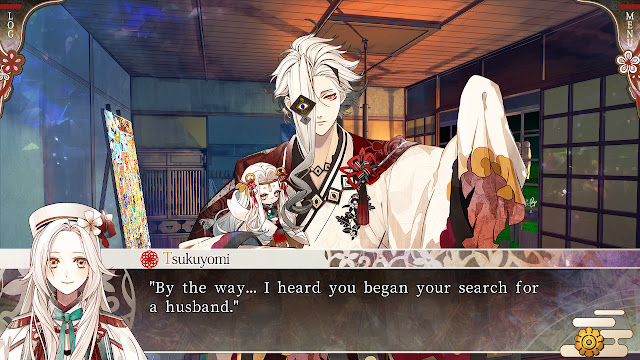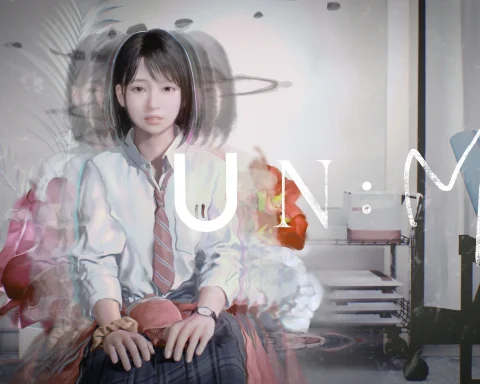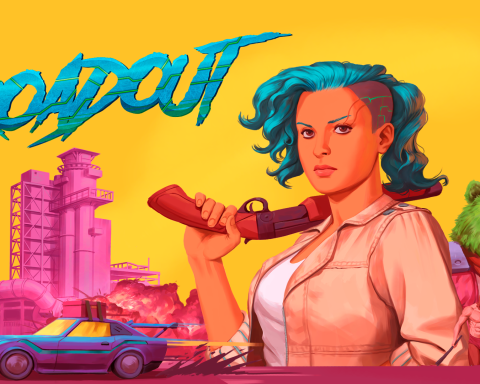One of the benefits of publishing a review a little later after release is that you can check against some of the other reviews to see how your own take on the various themes and ideas expressed by the game were taken by others. Having checked out a couple of other reviews of Olympia Soirée… whoo boy. There’s a lot going on with some of them. I don’t necessarily blame the critics for it – ultimately it’s on the storyteller to articulate what they’re trying to say – but Olympia Soiree seems destined to be one deeply misunderstood work. Which is a pity, because it’s pretty provocative (in the right sense of the word, as something challenging and interesting) and evocative.
There are three key themes in particular that power Olympia Soirée. The first is Shinto, and I’m not sure how this was absent from so much coverage of the game, because it’s pretty important, and also pretty blatant (the narrative keeps name-dropping Amaterasu and Yomi, and the biggest building on the island that the game is set is a massive Torii gate – it really could not be more explicit about it). The second is the depiction of a rigid caste system that is very much a parallel for real-world racism and a metaphor for more archaic Japanese attitudes. The third is romance, and really the game’s asking if #1 and #2 exist is #3 even possible? Especially when #1 and #2 lead society as a whole to view the protagonist, Olympia (her real name is whatever you want to call her), as a doll-like resource that is obligated to marry and start churning out babies.
The idea that the game somehow condones any of this absolutely baffles me. The narrative depicts some pretty abusive stuff (including outright rape). The caste system is depicted as cruel and oppressive. The abusers are not good people, and while Olympia is naïve in the extreme, her efforts to make the best out of the situation that she’s in only acts to make the horribleness of what’s going on around her all the more horrible. Perhaps people are thrown by the pretty boys and bright colours in screenshots, and assume that Olympia Soirée is meant to be some kind of sweet romance visual novel. I honestly don’t know, and yes, the lack of trigger warnings upfront is an issue, but Olympia Soirée is meant to be challenging and uncomfortable at points, and I’m a little concerned that some people out there seem to think that that’s a bad thing.
Olympia Soirée is a magnificent visual novel in every way. The characters are vivid and varied, and while some of them do land close to tropsey at times, the game’s languid pacing allows the writers to fully develop each character and, regardless of the romance route that you go down, you’ll end up with a full picture of a nuanced character and relationship dynamic between the two. The aforementioned languid pacing isn’t always paced right – the opening chapters of the game are information dumps that are about as pleasant as thumbing through the opening book of Lord of the Rings again – but I would rather a visual novel err on the side of giving players too much information than not enough. Olympia Soirée takes place on a completely alien location; a fantastic island where the sun goes out, people turn into crystals when they die, and hair and eye colour is determined by the caste your parents belonged to. If the writers didn’t take their time to properly explain everything, then the setting would have felt arbitrary, and hollow. This way, you’re fully equipped with the context you need before you start cracking on to one of the half dozen boys you can woo.
The art certainly helps to bring the world of Olympia Soirée to life, too. I will say that the backgrounds are often surprisingly functional by Otomate standards. They’re just a little flat, when I’m used to seeing meticulous detail brought to life through Otomate’s background artists. Then again, I wasn’t exactly paying attention to these backgrounds. Each of the boys in Olympia Soiree is a masterpiece of character art, and Olympia herself is just beautiful. The torments she goes through at points hit all the harder given that you’re almost certainly going to fall utterly, head-over-heels in love with her. There’s a cute little mouse character that calls Olympia “hime” (the mouse is intelligent and has coherent throughts, though only we, the audience, are privvy to them). “Hime” is Japanese for “princess,” and that’s pretty accurate, really. Olympia is the classical “princess” type, as much as the game subverts the “princess finds romance” storyline. There are other Otomate protagonists that I struggle to remember, but Olympia is one that I won’t soon forget.
I’m obviously avoiding spoilers here, but the one issue I have with the game’s narrative is some of those endings. As is standard for the genre, there are good endings and bad for the main routes in Olympia Soirée, but many of those endings only exist because the writers were obligated to put them in. These endings often rely on the characters doing things that they just wouldn’t do, so the writers could shove a square peg into a circular hole. It’s a genre trope that they likely can’t ignore, since otome fans want “good” and “bad” as well as “true” endings, and would riot if they don’t get them. But, when you’re dealing with very specific themes and carefully-designed characters, it’s not really possible to just ending switches on or off and not have that compromise the integrity of the rest of the story in at least some of the cases. As is the case with many Otomate offerings, I almost wish that Olympia Soirée was a kinetic VN with absolutely no decisions nor alternative endings.
Olympia Soirée really is a distinctive and interesting visual novel, however. The Shinto themes and elements give it an entirely Japanese aesthetic and tone, and that’s supported with just the most gorgeous soundtrack, filled with traditional instruments. The art and setting for the game are both impeccible, and while Olympia Soirée will put some players off with its harder, darker edges, this is ultimately a game that has something to say. Yes, sure, that means it’s not always the feel-good romance that you might have been expecting from the screenshots… but wouldn’t you rather a game that got you thinking? I know I do.










